Old Testament Prophets
This talk was given by Professor Andrew Basden on .
The total length of the recording is .
Play in browser
A transcript is available lower down the page.
Downloads
MP3 (12.2 MB) (96kb/s constant rate)
MP3 variable rate encoding (13.8 MB)
The licence information for the talk and Bible passages are at the bottom of the page.
Transcript
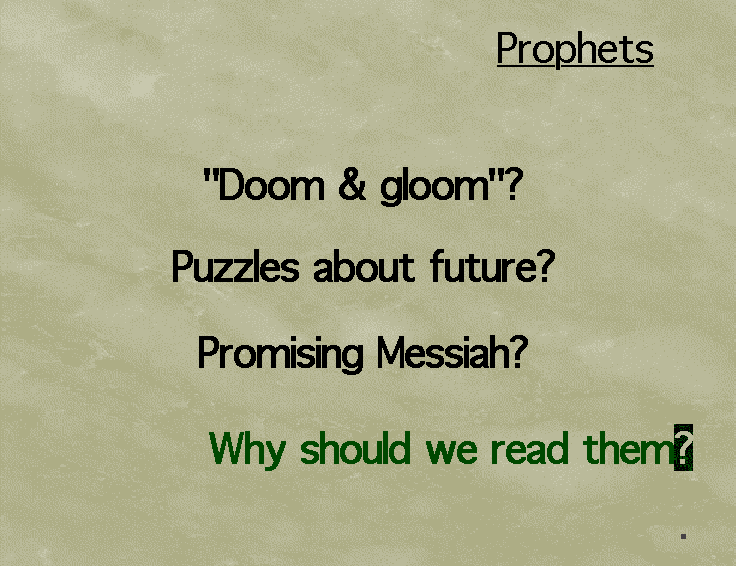
We’ve been looking at prophets. A week or two ago we had in the news about, what was it? Super-forecasters: prophets and super-forecasters are not quite the same thing, because prophets don’t necessarily tell what’s going to happen. They give warnings so that we have a choice. But what do we know about the prophets, especially the Minor Prophets? Do we think they’re all doom and gloom or are they puzzles about the future? Why are we interested in them? Because the promise of a Messiah?
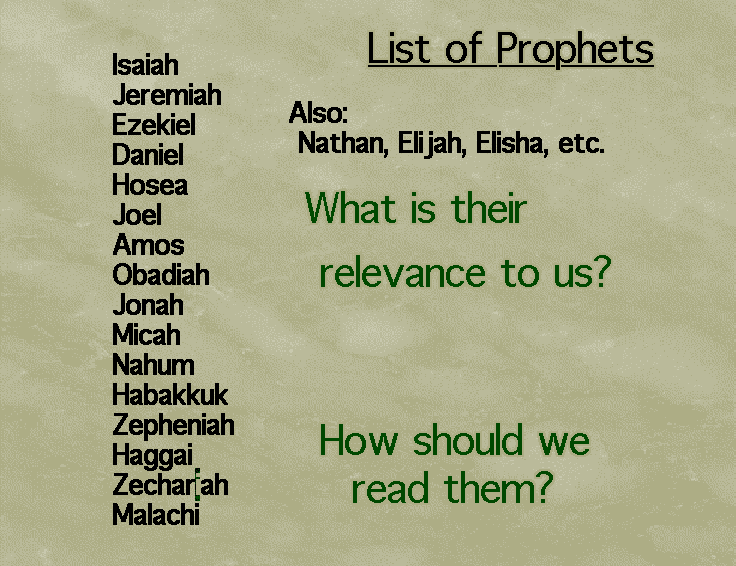
Why should we read them? How many people have read all the prophets, only two, and one not from this church? Well done [laughs]. How many people have read, let’s say three of the Minor Prophets? That’s a bit better. The Minor Prophets, are those, not Isaiah, Jeremiah, Ezekiel, or Daniel, those are the Major Prophets. The Minor Prophets are Hosea through to Malachi. We’ll see. We’ve already had talks on three of the prophets, Jonah last week from Neil, and then a few weeks ago, Joel and Amos from Paul, but there’s a whole lot more. Those are the ones that have books and these are ones that are mentioned in Kings and Chronicles, and there’s a few others that don’t have their own books.
The question that I want to address today is, what is their relevance to us? How should we read them? A very common idea is that we should read the prophets because they speak of Christ. That came from Origen, who was around about 200, 300 AD. Is that right? For the last 1800 years, the attitudes that many have taken to these prophets is that they speak of Christ.
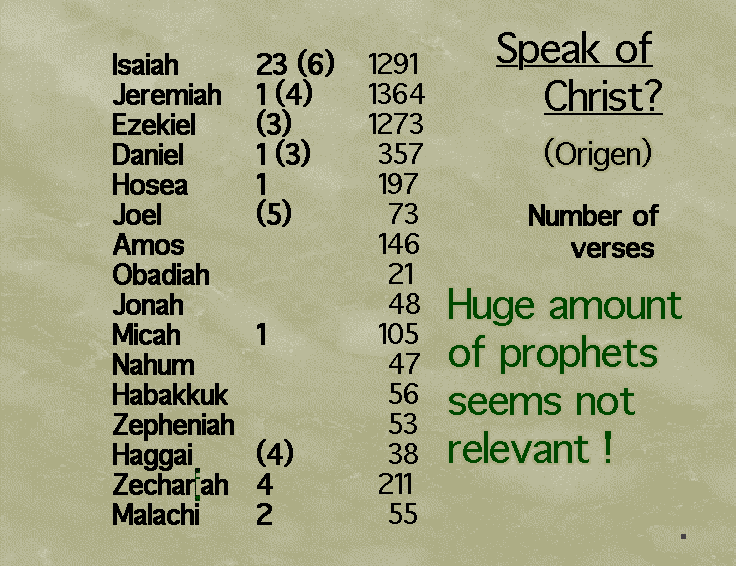
Let’s have a look. There’s quite a number of verses that speak of Christ in each prophet. The main numbers are the direct verses and then there’s a few others that could speak of Christ. There’s quite a smattering of verses, but let’s have a look at the number of verses that are in the prophets as a whole. 1,291 in Isaiah, of which 23 speak of Christ and 29 if you want to include those. In Jeremiah 1300 of which about 5 speak of Christ and so on.
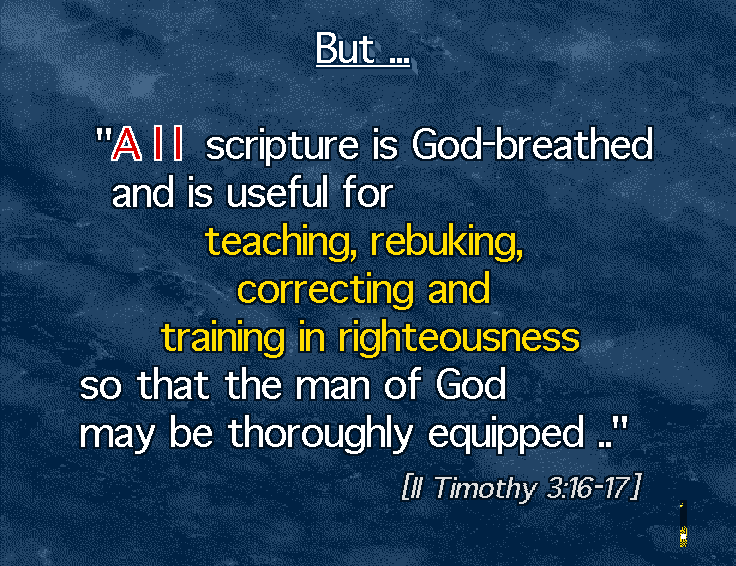
Now there might be others, these numbers are from the internet. The implication to me is there’s a huge amount of the prophets that doesn’t seem relevant to us. No wonder most of them don’t read all the prophets, but do you know this verse 2 Timothy 3:16, “All scripture is God-breathed and is useful for teaching, rebuking, correcting, and training in righteousness, so that the man of God may be thoroughly equipped for all good works.” All scripture, including the 99% of the prophets we don’t read. How can we fulfil that? That was Paul speaking after Christ had come, he understood Christ and he still said that.
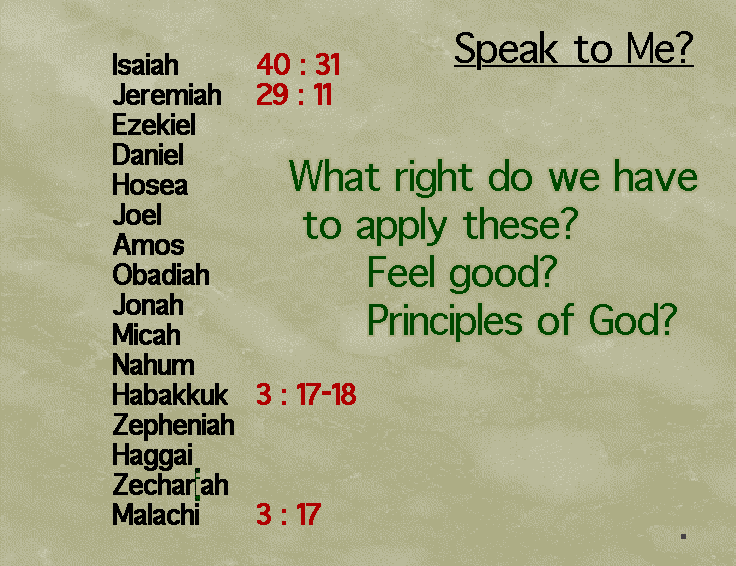
Another way that’s we might read the prophets is that they speak to me. Isaiah 40:31. Does anyone know what that says? “Those who understand the Lord will rise up like Eagles” We often use that as an encouragement. What about Jeremiah 29:11, does anyone know what that one is? “I have a plan for you, to give you a future and to hope.” What about Habakkuk 3:17–18?
[Congregation:] Though there’s no sheep in the field.
[Andrew:] That’s right.
[Congregation:] Yet, I will praise Lord.
[Andrew:] “Yet, I will trust in the Lord.” That’s Habakkuk three. Well done. Malachi 3:17.
[Congregation:] Congregation: Open up the heavens and see what things …
[Andrew:] No. Not open up the heavens. Does anyone know about anything about jewels and God making up his jewels? “They will be mine when I make up my jewels” and we occasionally use that as a comfort to those who feel lack of identity. But my question is, what rights do we have to apply these to us? Sometimes the Holy Spirit does shine a light on a verse for us in a particular situation, but then we having been blessed by it, we then give it to others. What right have we to apply these verses to us in general? Is it just that make us feel good or is it they speak of principles? It might be, but there’s a question there.
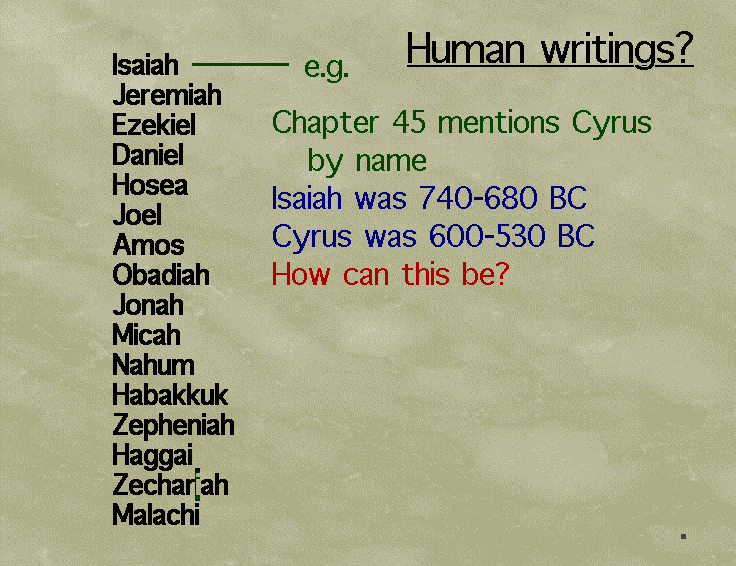
The third way of looking at the prophets is just as human writings. Take Isaiah for example, chapter 45 mentions the name of Cyrus, the Persian King. Isaiah was around 740 to 680 BC whereas, Cyrus was around a 100 or so years later. How can that be? Now most of us would say, “God can prophesy the names of people.” He did for Josiah as well, but there are other people who say who don’t like the idea of God doing miracles and they try to explain it another way by saying, “That bit of Isaiah was written a 100 years after the real Isaiah, and just added into his book.” It could be that, but I see no evidence in the document that that is the case. That’s something to deal with another time, but human writings?
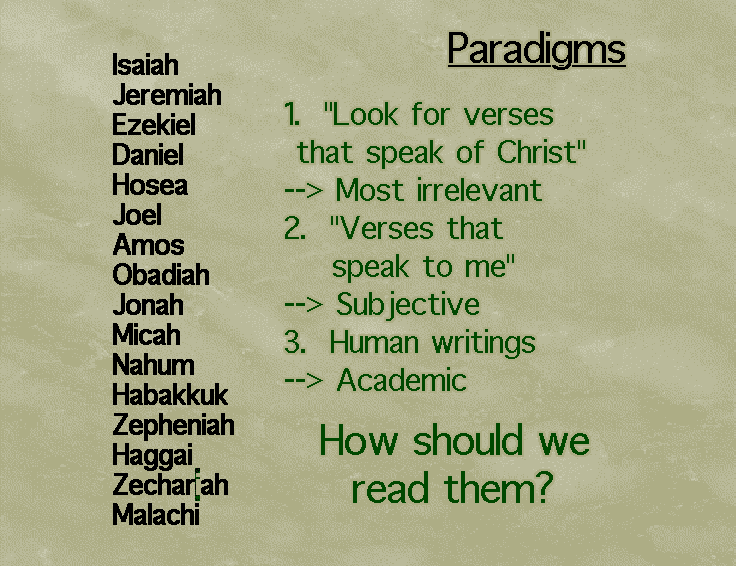
There’s a thing in science and research called paradigms, ways of looking at things, how to read our topic. We’ve had three paradigms: look for verses that speak of Christ and we find that most of the prophets are irrelevant; look for verses that speak to me and we end up in subjectivity; look for human writings we become overly academic. I think all those have some truth in them, but I’m not satisfied with those. I want something that goes beyond these.
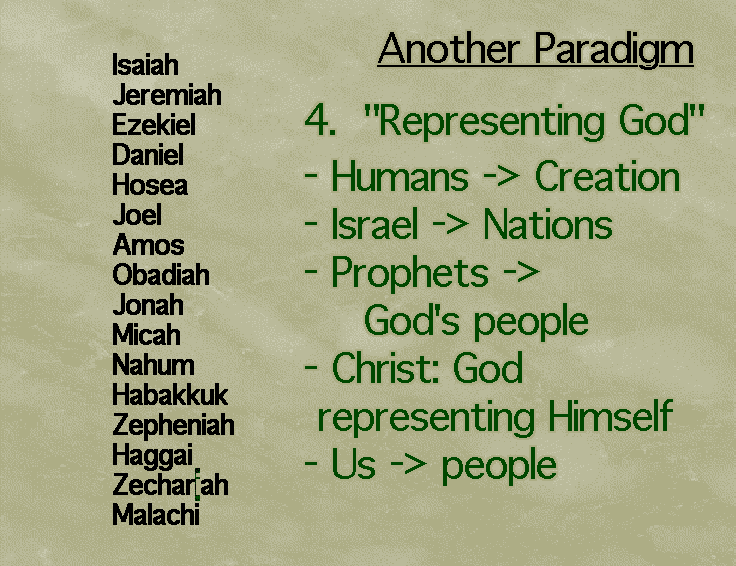
There’s another paradigm which is about representing God. Let me see what I say about these. First of all think of your hand, the five digits in your hand. Number one, humans were designed to represent God to the rest of creation. Two, Israel was designed to represent God to the nations, as a nation to other nations. Three, the prophets were designed to represent God to God’s people. We’ll come back to that later. Jesus – oops, I was a bit trigger-happy there, Anyway – Christ was God representing himself to us, and we who follow Christ or are committed to him, we represent God among the peoples, not as a nation among other nations, but we are people among the whole, all the peoples of the world. We’ll come to understand that a little bit more.
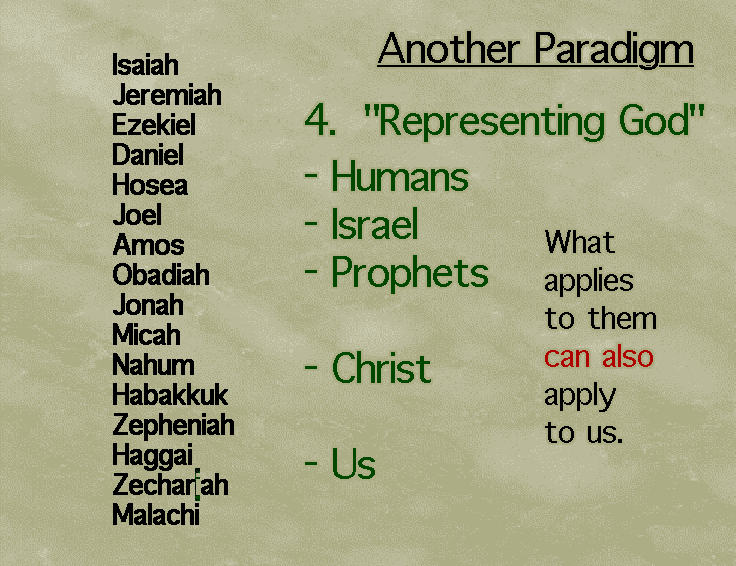
What this means is that what applies in the prophets to Israel, all the prophets or even to Christ can also apply to us, if we think of the prophets as showing us how we should represent God.The theme of representing God is throughout the scripture and takes various forms. That’s the way I see the prophets, that’s the basic way I satisfy myself that it’s valid to take the prophets and see their relevance to me and us today. I’ll give you some examples at the end.
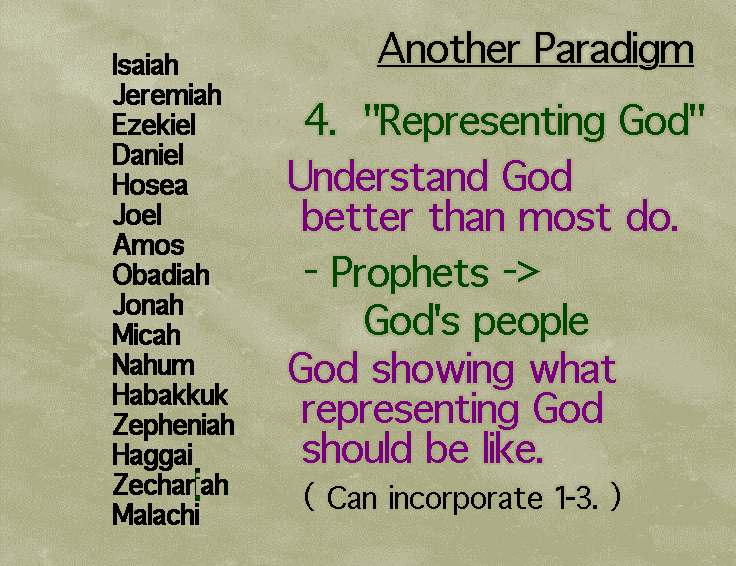
Let’s have a look at the prophets representing God to God’s own people. What they were doing, they were showing what representing God should be like. The people of Israel should have been representing God and didn’t. The prophets are sent by God to warn them, to say, “This is what you should be doing. Keep the Sabbath,” or whatever it was in any specific situations. They were speaking into that situation and showing what it should be like to represent God. They were people that understood God better than most do, and perhaps that’s what we are. We might not understand God very well, but there’s something in us, each one of us, that understands God better than most do, so that we can convey that understanding, not for our own benefit or for our own reputation, but for the help of others.
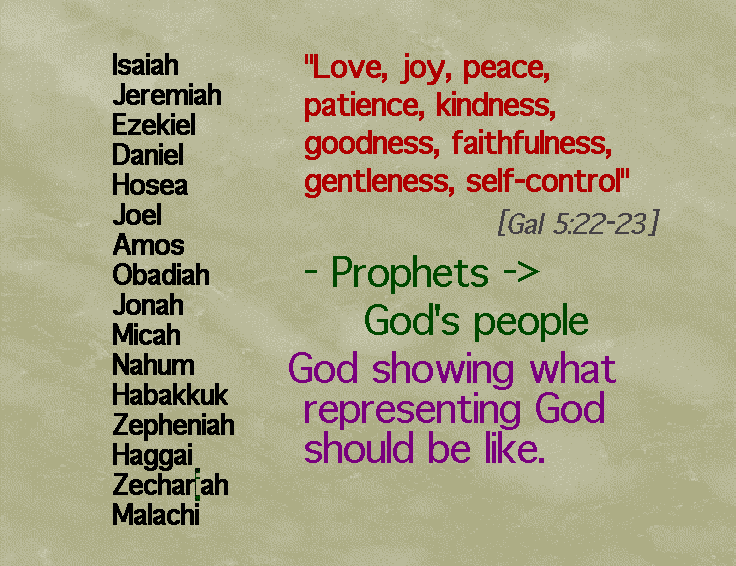
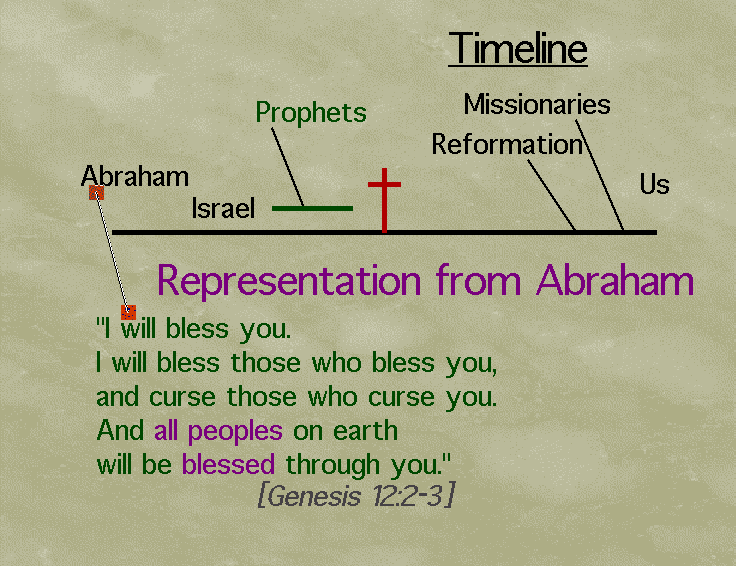
Now, this paradigm can incorporate the other three, but I won’t go into that today. What I want to do is to take this idea and apply it to the prophets. Let’s have a look at the timeline, a long timeline, 4,000 years. There’s Abraham 4,000 years ago. There’s Jesus 2000 years ago, and there’s us, and Israel the people of Israel were somewhere around here. The prophets of the books were of this era, and maybe Elijah and Elisha were about there. I see representing God, starting with Abraham. You see God, when he first met Abraham, gave him a promise. Does anyone remember what that was in Genesis 12?
Yes. He says, “I will bless you. I will bless those who bless you and curse those who curse you and all peoples on earth will be blessed through you.” That’s Genesis 12. Now look at this, there’s several parts. First of all, I will bless you, you and your people. Abraham, Israel, Jesus, us. All those who represent God in the line of Abraham. I will bless you. I will bless those who bless you and curse those who curse you. I will support you. I will protect you when you’re persecuted. I will look after you.
But why? Because of the heart of God of love. He wants to bless all peoples on earth. All peoples remember, not just the people of Israel or us but all peoples. I see us as fitting in to that 4,000-year-old promise that is still relevant and can speak to people of other religions. A couple of things in the church era of reformation, the missionaries went out because God had prepared the way for all peoples on earth to receive the gospel.
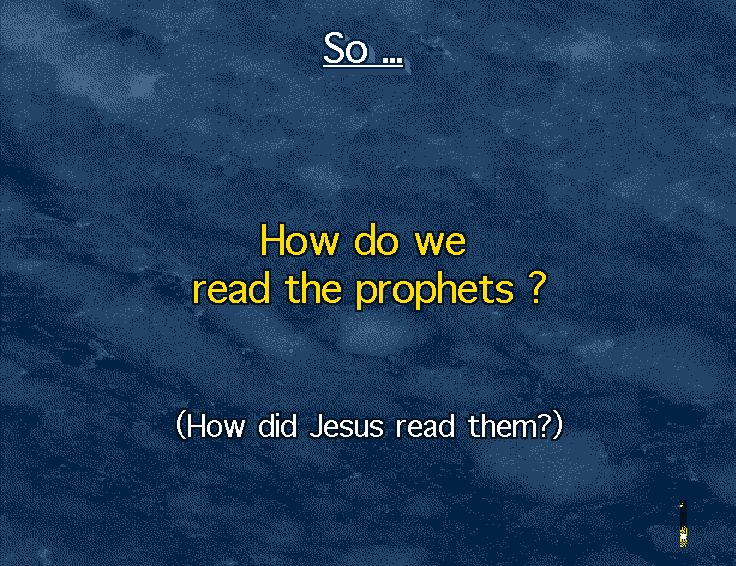
How do we read the prophets? How did Jesus read them? Do you remember when Jesus was speaking to the Pharisees or somebody anyway and He pointed out that Elijah was sent not to any widows of the people of Israel, but to a pagan widow in Tyre of Sidon that God had prepared there. He was making the point from that little incident that God is concerned about more than just Israel, concerned about all people. That’s how Jesus used the prophets. He looked at what God was doing and saying, and saw the common sense in them and that’s what I want to do.
I’ve got to say a little bit about the prophetic books and then I’m going to take six examples, just as examples.
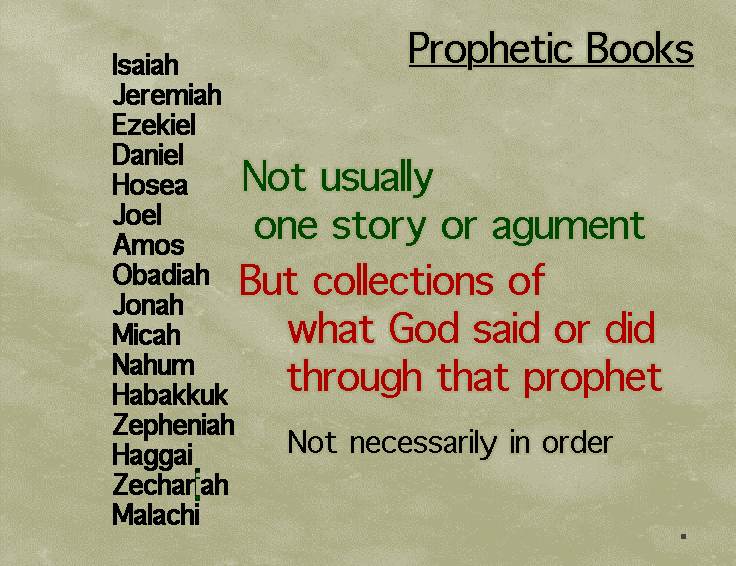
Here are the prophetic books. Most of them are not usually one-story or argument except perhaps that of Jonah. Most of them are collections of what God has said or done through that prophet, and they’re not necessarily in order. For example, the end of Jeremiah has bits and pieces from earlier, relevant to earlier in Jeremiah, but also the order in which they occur in the Bible is not necessarily in chronological order. They’re sort of in chronological order if you take the Major Prophets first and then the Minor Prophets.
Let’s have a look at the eras in which the prophets spoke.
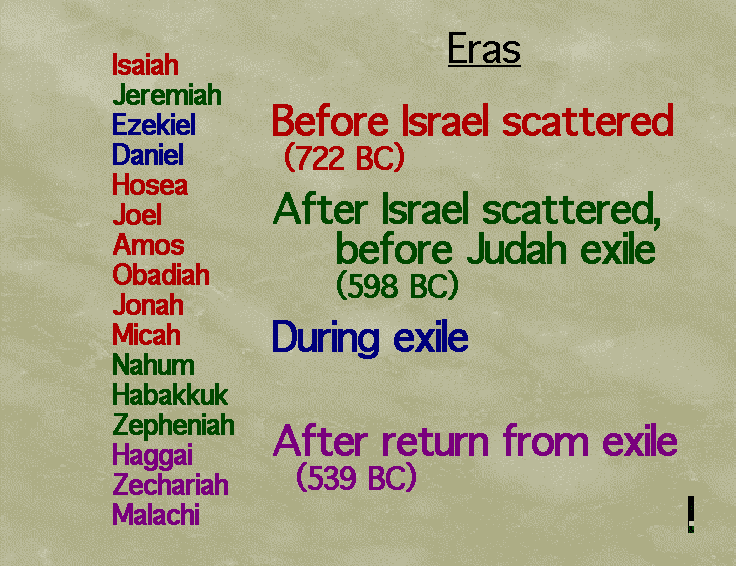
The first era was before Israel was scattered. If you remember, there were two nations, the Northern Kingdom of Israel and the Southern Kingdom of Judah and God took them both away. The Northern nation of Israel was, almost all their Kings were wicked, except perhaps one. The people went after other gods and did not represent God properly so he took them away in 722 BC by the kingdom of Assyria, and these prophets: Isaiah, Hosea to Micah were speaking during that period. Amos for example, was speaking specifically to the people of Israel rather than Judah, even though he came from Judah.
After Israel was scattered, but before Judah went into exile in 598, there were four more prophets through whom God spoke. Interesting Nahum was not a prophet to Israel. He was a prophet to Nineveh, like Jonah was. Then two more prophets spoke during the exile, and then after the return from exile in 539 BC, there were three more prophets.
All these groups have different messages, although there’s something common throughout them all.
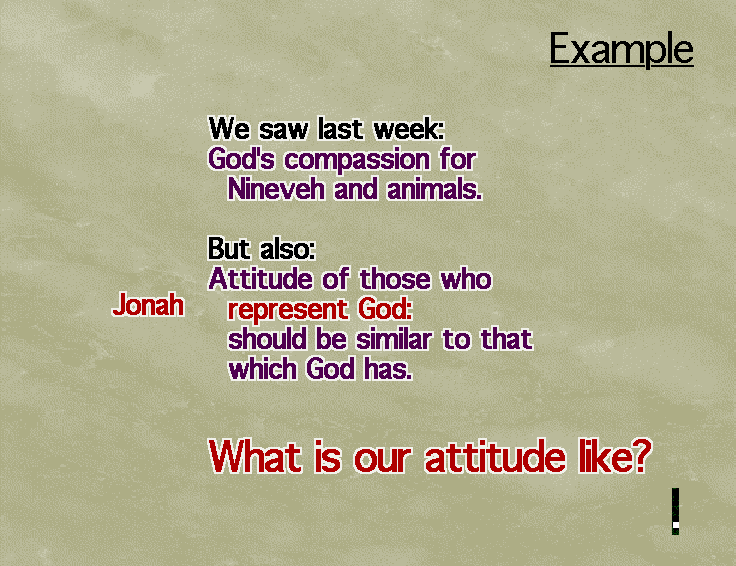
Now I was going to give you, if you like, a lecture time. I’m a lecturer, so I was going to say, “Here are the things in the prophets.” I decided to keep that out because of time. I just want to make it more direct. I’m going to go through six examples. Jonah, we saw last week from Neil, God’s compassion on Nineveh and animals. Remember? But also we saw that the attitude of those who represent God should be similar to that which God has. God said at the end, “Look, I have compassion on Nineveh and all these animals should you not also have that compassion, Jonah?” We don’t know whether Jonah ever repented, but the fact that it was recorded and he was happy to have that in his book suggest that perhaps he did learn the lesson. There is a question for us: what is our attitude like to those outside?
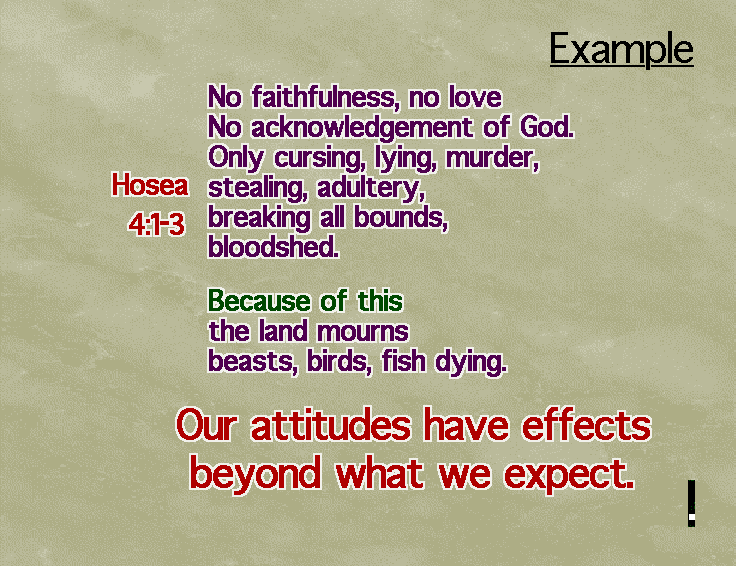
Let’s look at another little passage in Hosea, a little bit more about attitude. It says “No faithfulness, no love, no acknowledgement of God in the land, only cursing, lying, murder, stealing, adultery, breaking all bounds, bloodshed upon bloodshed.” That’s verses one and two. That’s what God’s people were like. They weren’t representing God properly, were they? They weren’t showing the nations that living under God’s laws could be glorious and prosperous, but then verse three, “Because of this, “ it says, “the land mourns and beasts and birds and fish are dying.” Hang on a minute, because we’re lying, does the land mourn? Because there is stealing, do the beasts die? Because there is adultery, do the fish die? What’s the link there?” That makes me sit up and think, hang on a minute. There’s something going on here in God’s creation that I don’t understand, and perhaps what I learn is that our attitudes have effects that we don’t expect. That’s why we can’t justify ourselves. God knows what these links are, everything interconnected. Salutary, I find.
Another example, Amos, Paul has spoken on Amos, but let’s go to chapters one and two. I’ll read a little bit of chapter one.

“This is what the Lord says, for three sins of Damascus, even for four, I will not turn back my wrath, because they threshed Gilead with sledges having iron teeth. I will send fire upon the house of Hazael,” that’s the King of Syria or Damascus, “that will consume the fortresses of Ben-Hadad, I will break down the gate of Damascus. I will destroy the King who is in the Valley of Aven and the one who holds the sceptre in Beth Eden. The people of Aram, that’s Syria, will go into exile in Kir, says the lord.” What on earth is that about? What relevance does that for us? Read on in chapters one and two and you find that there are seven nations that God gives little bits of woe to. Notice something there, notice the last two, Judah and Israel, and notice the first five, they are nations going around them. There, God is saying, “All of you, I am God of the whole world. I am not just a tribal God of Judah and Israel, as the pagans used to expect. I, if you like, I’m in charge of the whole world and I am concerned about the whole world, and so I am going to bring justice on all these for their misdoings, equally God’s people and those who are not God’s people.”
What does God find against them? Cruelty, enslavement, no compassion on his brother, ripped open pregnant women, burned bones, rejected God’s law, full of false gods, injustice to the powerless. Do you notice a difference there?
Judah was going to be put into exile because they followed false gods but surely these followed false gods and yet God’s didn’t mention that. How come? Because to these nations, he had, if you like, judged by different standards. He judged by normal standards of, it’s been said that these are just war crimes, I think it was Martin that suggested that, but God’s people are judged differently. Do you know the verse in Hebrews? Judgement starts first with the household of God. Ever wondered what that meant? We are judged by different standards, not because God is more harsh, but because he wants us to represent him in the world. He wants us to follow His laws and show how life designed by him should be. We’re not very good at it, but at least something, and so we are challenged.
Jesus said, “Forgive us our trespasses as we forgive those who trespass against us.” Are there any among us who are holding unforgiveness, grudges against others? Never mind what they are doing, whether they’re other Christians or not Christians, we are called upon to forgive as God in Christ forgave us. We have a higher standard if you like. Not as a burden, because God actually helps us follow it by his Holy Spirit.
Injustice to the powerless. Has anyone heard of the historian Tom Holland, how many? Okay. A few. He’s just brought out a book about Christianity and there’s one big thing about this, he says, “Christianity and Judaism, especially Christianity, brought in concern for the poor, whereas the pagans had no concern for the poor.” That tells me, that little bit of passage that doesn’t seem very promising, tells me, “Hang on a minute, I have the privilege of different standards.” A privilege.
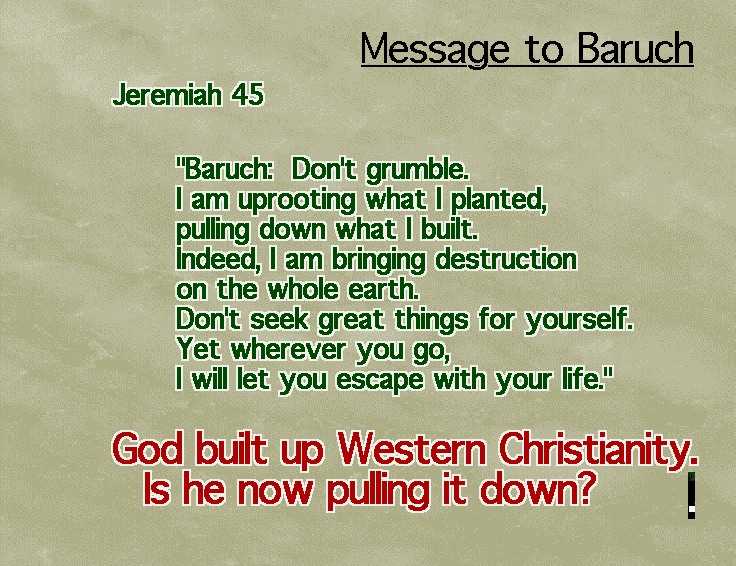
Jeremiah 45, there’s a little chapter, it’s a message to Baruch, who was Jeremiah’s scribe. Baruch was about to give up, he was under persecution. The Lord said to Baruch through Jeremiah, “Baruch don’t grumble, I am rooting what I planted, pulling down what I built. Indeed I am bringing destruction on the whole earth. Therefore, don’t seek great things for yourself, yet wherever you go, I will let you escape with your life.”
Now, what do we get from that? Okay. Most of us might get this bit, that God is concerned about people, but have a look at this. If God uprooted what man or humankind planted, that would be pretty bad, but if God uproots what he has planted, that’s a disaster. It’s tantamount to God saying, “Okay, world, I got it wrong.” He was uprooting the children of Israel, the ones he planted because He is holy, because he wants us to represent him properly. He wanted Israel to represent him properly. He had a wider, bigger plan, and it involved destruction of the earth, everything on earth at that time, uprooting of the nations so that the Messiah could come.
God built up Western Christianity through the various movements like the Reformation and the Wesleyan movement, the Holiness movements and all these other things. Is He now pulling it down? That’s what I wonder. Is God pulling down Western Christianity and building up something elsewhere for the rest of the world? It helps me to not get too worried about Donald Trump, for example. There’s a political statement that shouldn’t have come from the pulpit, perhaps, but never mind.
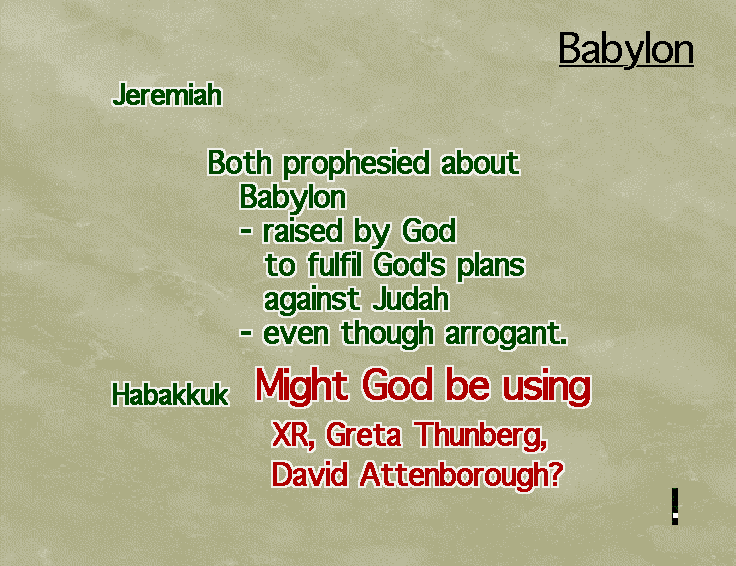
Jeremiah and Habakkuk both have little bits about Babylon. You see, they saw, God revealed through them, that even though the Babylonians were arrogant, proud pagan people worshipping other gods, God was using them to fulfil His plans against Judah. So what does this tell us? What does it tell me? Is it that God might be using other things than Christians in his plans? A year ago, Extinction Rebellion, Greta Tunberg and two films by David Attenborough all coincided and changed the discourse about environmental and climate responsibility. The discourse wouldn’t have changed had only one of those happened, but all four together. I wonder whether God was the one who caused that coincidence. Even though neither Extinction Rebellion nor Greta Tunberg nor David Attenborough are known to be Christians. God maybe was using them. I wonder. God has shown that he can use others in his plans, even against his people. Might God be asking his people today to take the lead in the change discourse? Many Christians are involved in that. We saw a film yesterday where a vicar was being arrested. Well done.
Last one.
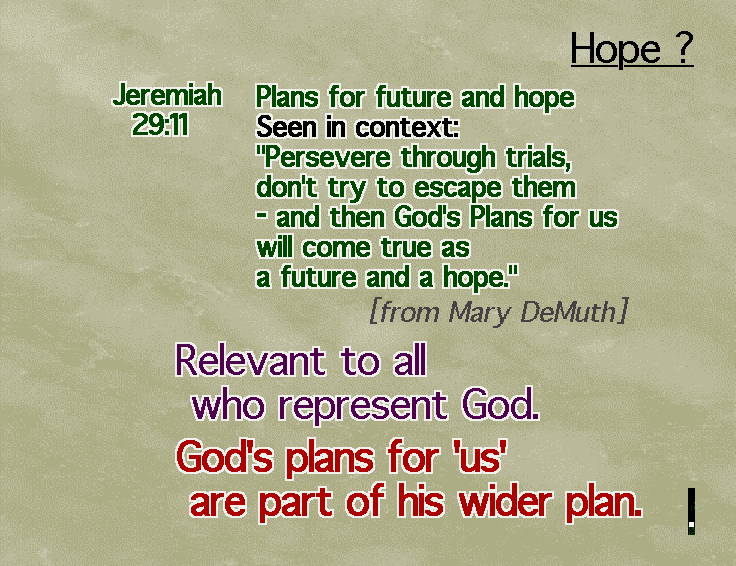
Let’s go back to a verse that we’ve mentioned, plans for future and a hope. If we look at it in context, we see that it’s the letter Jeremiah wrote to the exiles to say, “Folks, your false prophets are saying that you’ll be freed in two years. No, God has said is going to be 70 years. So seek the prosperity of where you are, work for them. Don’t see yourself as against them, because I have a plan for you in the long term that will come true as a future and a hope.” Whereas often we use this, “I have plans for you” as a kind of escape from trouble. God is effectively saying, persevere through trials you who represent me, don’t try to escape them, and then God’s plans for us will come true as a future and a hope. This is relevant to all who represent God, perseverance through trials. I gain hope that God’s plan for us are part of his wider plan. They’re not just plans for us, they’re part of his wider plan. That gives me meaning in life.
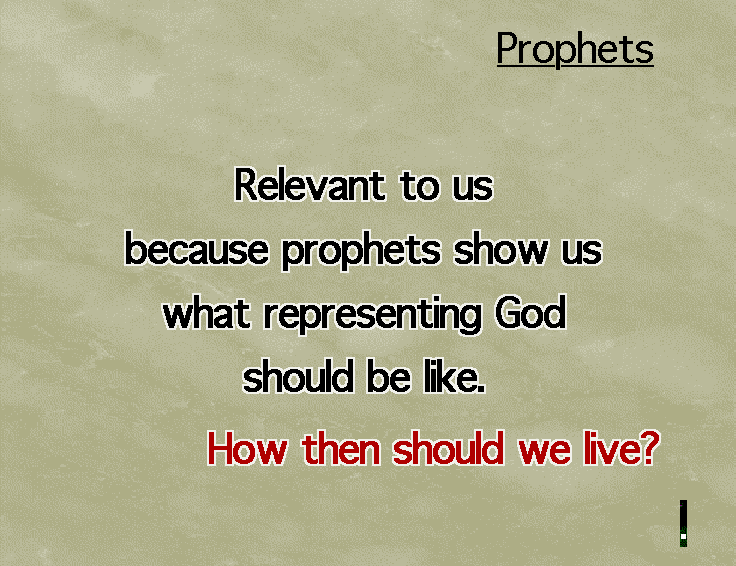
Let’s conclude. What I’ve been trying to say, is that prophets are relevant to us, because prophets show what representing God is like. The challenge is, how then should we live? That’s the challenge, and that’s the hope, and the comfort.
Licences
This talk is licensed under a Creative Commons Attribution-NonCommercial-NoDerivatives 4.0 International License
The illustrations are copyright © Andrew Basden 2020 and may not be reused without his permission (see http://abxn.org/copyright.html).
Scripture quotations marked NIV on this page and in the audio are from the HOLY BIBLE, NEW INTERNATIONAL VERSION. Copyright © 1973, 1978, 1984 by International Bible Society. Used by permission.
